Interview with Neema Nene Lubala at the WPS South South Exchange in Wau South Sudan
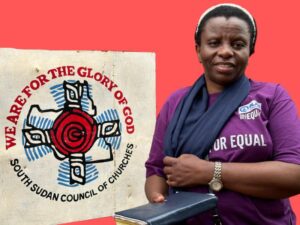
Rachel Warden and Jane Thirikwa were in Wau, South Sudan in late July, hosted by the South Sudan Council of Churches during the Women, Peace and Security partners exchange. While in Wau, they had an opportunity to sit down with Neema Nene Lubala of Héritiers de la Justice, which is based in the Democratic Republic of the Congo (DRC).
KAIROS: What has your experience of the exchange been so far here in South Sudan?
Neema: I have many experiences. I have learned so many things. Learning about the technique or strategies that the SSCC applies to help survivors of gender-based violence was very interesting. We also work with survivors of gender-based violence in DRC, because we live in a similar context, and we have our own strategies. Here I have learned about the SSCC call centre and a toll-free number that women can use to ask for help, report, denounce and try to prevent gender-based violence. This touched me a lot. I am going to impart this knowledge to my colleagues at HJ in DRC. We have strategies, but not this one. It is important that this service is free.
Another thing that touched me was hearing about the experience of women through prayer. We practice prayer at Héritiers de la Justice but not as an advocacy strategy. Imagine being asked by the president to pray for him, like these women in women’s link were. That really struck me.
KAIROS: What have been the highlights?
Neema: A highlight for me was hearing how women in South Sudan have not surrendered. It is a country that continues to live in conflict and women who have not traditionally been heard and considered in peace are now being taken into consideration and valued by South Sudanese society as peacemakers. The stories of how women have helped other women in this work have moved me.
In Wau, I was so moved when the women welcomed us so warmly. They were so energetic when they expressed their ideas. They were like one with the women of the women’s link in Juba: they do similar activities. I learned that the monthly prayers started in Wau. I was so impressed.
I was greatly moved by the tree planting ceremony in Wau. We were asked to plant a tree for peace; first the local women’s link group, then Héritiers de la Justice, then KAIROS. With the tree I planted for Héritiers de la Justice in DRC, I left a message for peace in South Sudan and DRC: “May this tree bear fruit and when we eat this fruit may peace grow inside us and nourish us. This tree is also a symbol for peace in DRC where we also live with violence.”
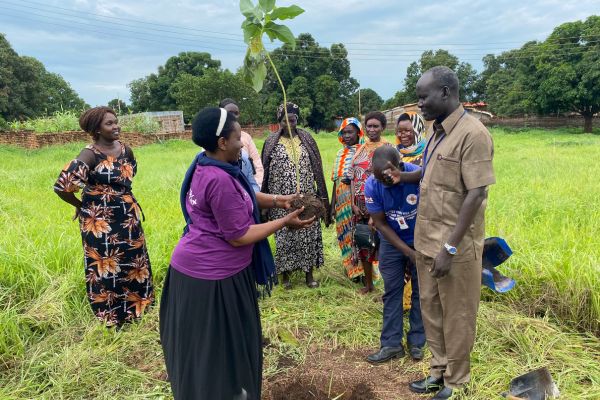 Tree planting in Wau, South Sudan by SSCC and HJ during the WPS South-South Exchange in July 2023. |
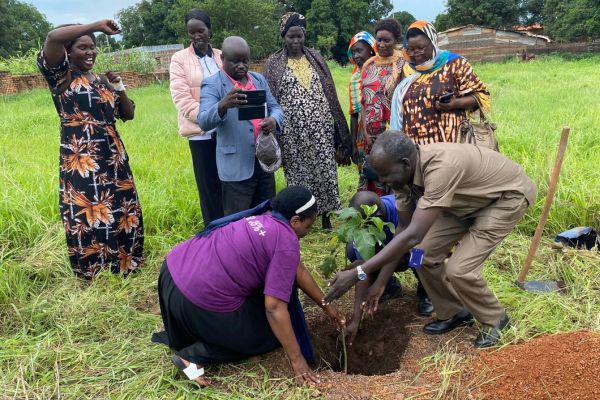 Tree planting in Wau, South Sudan by SSCC and HJ during the WPS South-South Exchange in July 2023. |
KAIROS: What other learnings will you take back to DRC?
Neema: I have learned so many things: for example, how the women here work with vulnerable women, including survivors of gender-based violence, how they build the capacity of these survivors and train them to produce crafts that they can sell. In so doing these women feel more valued, and they get support for their families.
I also learned about the house-to-house visits to vulnerable people in the community – children with difficulty and in need, orphans, the elderly. They identify them and go to them, identify their needs and, with the little means that they have, they help them. Because of this work, they are trusted in the community.
I was also so impressed that it was the women’s prayers for peace here in Wau, and inspired the monthly prayers for peace in Juba that are now all over South Sudan.
Another thing I learned was that South Sudanese women, like women in DRC, struggle a lot to be recognized and have positions of responsibility and authority. And yet here in Wau women are represented in all levels of government, and they are working toward achieving the 35 percent quota of women in parliament. They continue to struggle with this and in the DRC we work towards the 50 percent quota that is being demanded by the women there. We are in the same struggle.
KAIROS: What do you hope comes out of this exchange?
Neema: My hopes are many. I hope that there will be change in terms of women’s empowerment at all levels – in peacebuilding, economically, professionally, politically. I hope that we can apply what we have learned from one another, so that we can reach results in DRC and South Sudan. I hope that there will be women in all levels of decision making.
Specifically in terms of follow up to this exchange, we would like the SSCC to come and visits us. As Héritiers de la Justice this is our second time in South Sudan (although it is my first time in Wau). We want SSCC to see the reality of DRC. If they can speak from this direct experience, they will understand more, and people will trust what they are saying. We want them to come and feel our reality as we have felt theirs. As the current women, peace and security proposal comes to an end, we need to support and sustain each other in our resiliency even more.
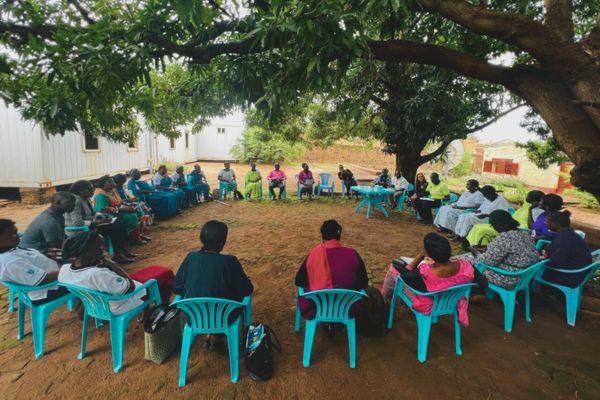 Wau South Sudan – circle meeting during the WPS South-South Exchange in July 2023. |
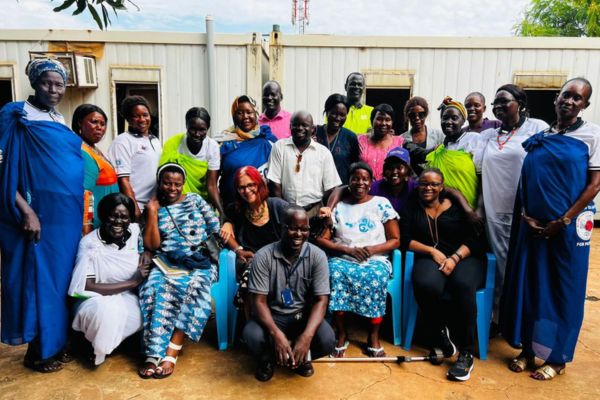 Group photo in Wau, South Sudan during the WPS South-South Exchange in July 2023. |
